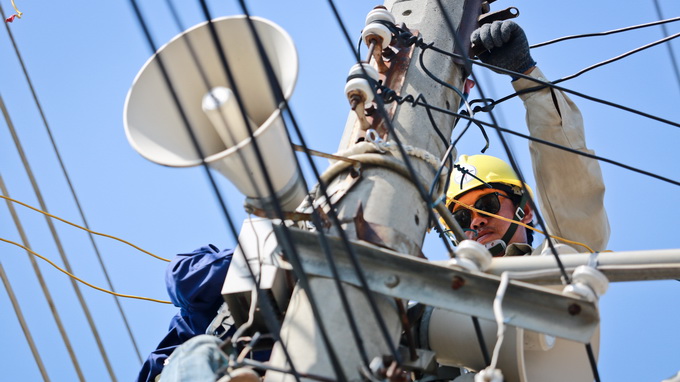Prime Minister Nguyen Tan Dung and Minister of Industry and Trade Vu Huy Hoang have pledged sufficient and stable power stable supply for foreign investors in the 2015-16 period.
>> An audio version of the story is available here
Despite high power consumption in the past few months, the local electrical system still has 20 percent spare capacity that remains unused, Minister Hoang said at a forum in Hanoi on Tuesday in response to concerns of investors about the risk of power outages in the near future.
Meanwhile, the price of electricity will follow market mechanisms in which the supply-demand relationship will be reflected via the price by the end of next year, the minister said.
However, he confirmed there will be unstable electricity supply in some areas due to the quality of the power grid there, which needs to be upgraded.
The government is encouraging the participation of many economic sectors, including the private one, in the construction of new power plants, and raising electricity prices following the market mechanism is one measure to make investment in power generation more attractive, the official added.
"From now to 2016, the electricity price will be adjusted, as proposed by foreign investors, to follow the market rate," Minister Hoang asserted.
In reassuring investors who worry about the lack of electricity, Prime Minister Dung said Vietnam will not face a power shortage between now and 2030.
Although some power projects have been delayed, which may result in power shortages in the south by 2018, the government has solutions for that.
He insisted on the market price of electricity with improved power quality, adding that the price hike roadmap will be transparent so that investors will be more confident when pouring money into the sector.
The bold statements of the senior Vietnamese state officials followed a proposal presented via a study by the European Chamber of Commerce in Vietnam (EuroCham).
Call for a price hike
The study, publicized on Friday last week, said the Vietnamese government should be more ambitious in raising the price that large industrial consumers pay for power.
Conducted by the International Institute for Sustainable Development (IISD) with support from EuroCham via its Green Growth Sector Committee (EuroCham GGSC), the study resulted from an in-depth consultation with the foreign business community in three workshops in January, along with a survey of 150 firms, and was carried out in partnership with the United Kingdom’s Foreign and Commonwealth Office – Vietnam, the Vietnam Business Forum, and the Central Institute for Economic Management.
The recommendation on energy pricing policy comes from the fact that many firms surveyed clearly indicated that energy prices are not a key driver of foreign investment in Vietnam, said the study.
Vietnam’s ability to attract foreign direct investment is not based on low energy prices, as stakeholder analysis and survey results indicate that firms do not typically invest in Vietnam because of the fact that energy prices have been historically low, according to the study.
In fact, firms ranked the state of power prices to be the least important of ten factors in their decision to invest in the Southeast Asian country, including the cost and availability of skilled labor, domestic market conditions and government development policy, which are all much more significant.
In addition, companies participating in the study showed a willingness to accept higher power prices over time as a key means of enhancing the functioning of Vietnam’s electricity sector.
This is likely partly to do with the fact that firms spend relatively little on electricity, as 90 percent of foreign companies across all sectors spend less than 10 percent of their total operating costs paying for electricity bills, with 60 percent spending less than five percent, said the study.
As a result, the majority of firms indicated that they would be willing to bear sustained nominal annual power price increases of 15 percent or more before reconsidering future investment, and more than 65 percent of them were willing to incur sustained price rises of more than 10 percent per annum.
The flip side
However, the firms surveyed are very concerned about the inadequacy of power supply and the prospects of diminishing supply reliability, considerably more so than by the prospect of higher power prices.
About 65 percent of firms said that they were either rather unsatisfied or not satisfied at all with power infrastructure and supply, while two-thirds of those who disclosed information said that they used back-up generation either ‘sometimes’ or ‘often’.
Furthermore, a large majority, 73 percent of firms, said that the unreliability of power supply was more damaging to Vietnamese investment competitiveness than the prospect of higher power prices over time.
As a result, ensuring adequate power supply should therefore be the key priority of Vietnamese energy policy, along with a long-term movement toward greener modes of electricity generation.
This, however, will only take place with higher tariffs for grid electricity by increasing investment in state-run power conglomerate Vietnam Electricity (EVN), said the study.
There is significant space and necessity for private-sector solutions to Vietnam’s power supply needs, the study said.
Given both the current inefficiency of the energy market and the difficulty of EVN in allocating investment capital, private sector investment will likely need to play an increasingly important role in securing adequate electricity supply in Vietnam over time, the study added.
Like us on Facebook or follow us on Twitter to get the latest news about Vietnam!



















































